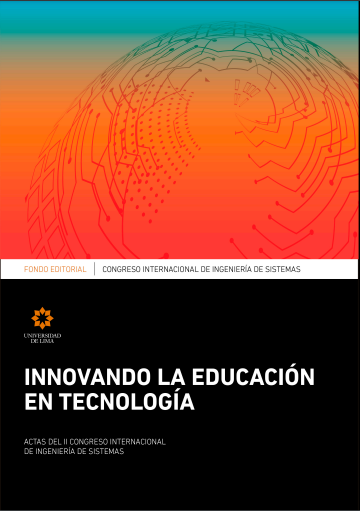Análisis de sentimientos de noticias escritas usando un modelo basado en la red neuronal long short-term memory para determinar si las noticias positivas mejoran el estado de ánimo de las personas
DOI:
https://doi.org/10.26439/ciis2019.5500Palabras clave:
aprendizaje de máquinas, análisis de sentimientos, red neuronal recurrente, long short-term memory, bienestar psicológico y socialResumen
Es un hecho que el paradigma de distribuir noticias negativas a la población es el más aceptado mundialmente. Una gran cantidad de investigaciones se han enfocado en establecer los efectos de este paradigma en la población y, en todos los casos, se ha demostrado que es dañino para la salud y el comportamiento de las personas. Por ello, se ha decidido demostrar que el paradigma opuesto, la distribución de noticias positivas, genera una mejora en la salud, en el comportamiento y en el estado de ánimo de la población. Para lograr este propósito, se desarrolló un modelo basado en la red neuronal long short-term memory para realizar el análisis de los sentimientos relacionados con las noticias escritas en español. El experimento consistió en determinar el estado de ánimo de las personas luego de haber leído noticias positivas.
Descargas
Referencias
Bastien, F., Lamblin, P., Pascanu, R., Bergstra, J., Goodfellow, I., Bergeron, A., Bouchard, N., Warde-Farley, D., y Bengio, Y. (2012). Theano: new features and speed improvements. Deep Learning Workshop, NIPS 2012.
Bergstra, J., Breuleux, O., Bastien, F., Lamblin, P., Pascanu, R., Desjardins, G., Turian, J. P., Warde-Farley, D., y Bengio, Y. (2010). Theano: a CPU and GPU math expression compiler in Python. Proceedings of the Python for Scientific Computing Conference (SciPy 2010).
Cronbach, L. J. (1951). Coefficient alpha and the internal structure of tests. Psychometrika, 16(3), 297-334. doi:10.1007/BF02310555.
Easton, V. J., y McColl, J. H. (2007). Statistics glossary: Sampling. Recuperado de http://www.stats.gla.ac.uk/steps/glossary/sampling.html
Famili, A., Shen, W.-M., Weber, R., y Simoudis, E. (1997). Data preprocessing and intelligent data analysis. Intelligent Data Analysis, 1(1), 3-23.
Fredrickson, B. L. (2001). The role of positive emotions in positive psychology: The broadenand-build theory of positive emotions. American Psychologist, 56(3), 218-226.
Gers, F., Schraudolph, N. N., y Schmidhuber, J. (2002). Learning precise timing with LSTM recurrent networks. Journal of Machine Learning Research, 3(1), 115-143.
Gers, F. A., Schmidhuber, J., y Cummins, F. A. (2000). Learning to forget: Continual prediction with LSTM. Neural Computation, 12(10), 2451-2471.
Hatemi, P. K., Funk, C. L., Medland, S. E., Maes, H. M., Silberg, J. L., Martin, N. G., y Eaves, L. J. (2009). Genetic and Environmental Transmission of Political Attitudes Over a Life Time. Journal of Politics, 71(3), 1141-1156.
Hochreiter, S., y Schmidhuber, J. (1997). Long short-term memory. Neural Computation, 9(8), 1735-1780.
Kingma, D. P., y Ba, J. (2015). Adam: A method for stochastic optimization. CoRR, abs/1412.6980.
Klevecka, I., y Lelis, J. (2008). Pre-processing of input data of neural networks: The case of forecasting telecommunication network traffic. Telektronikk: Telecommunications Forecasting (Special issue in co-operation with International Institute of Forecasters), 104(3/4): 168-178.
Johnston, W. M., y Davey, G. C. (1997). The psychological impact of negative TV news bulletins: The catastrophizing of personal worries. British Journal of Psychology, 88, 85-91. doi:10.1111/j.20448295.1997.tb02622.x
Tieleman, T., y Hinton, G. (2012). Lecture 6.5-rmsprop: Divide the gradient by a running average of its recent magnitude. COURSERA: Neural Networks for Machine Learning, 4(2), 26-31,
Trochim, W. K. (2007). Sampling. Research methods knowledge base. Recuperado de http://www.socialresearchmethods.net/kb/sampling.php
Watson, D., Clark, L. A., y Tellegen, A. (1988). Development and validation of brief measures of positive and neative affect: The PANAS Scales. Journal of Personality and Social Psychology, 54(6), 1063-1070. doi:10.1037/0022-3514.54.6.1063
Zhang, Z., Ma, L., Li, Z., y Wu, C. (2018). Normalized direction-preserving Adam. arXiv:1709.04546v2






